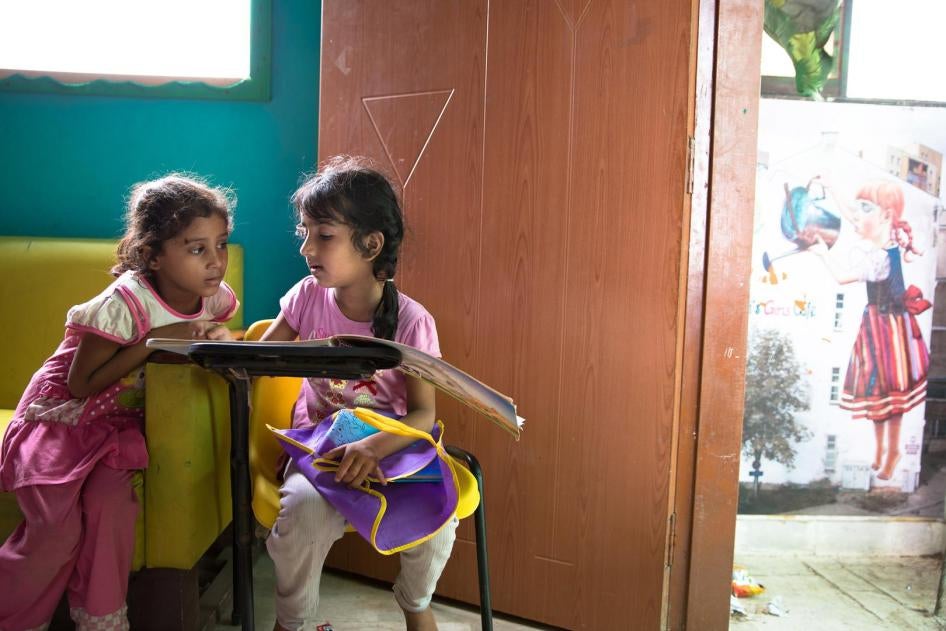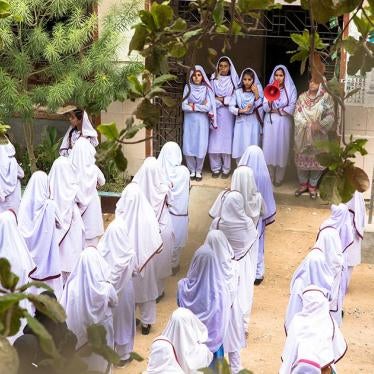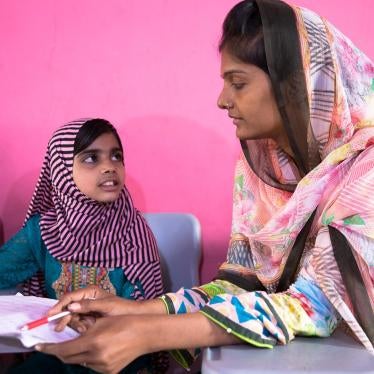Pakistan’s new government has promised to fix one of the country’s biggest conundrums—how to get more girls into school. The UK—which gives more aid to Pakistan than any other country, much of it for education—should both push and help Imran Khan’s government to keep that promise.
Pakistan is facing an education crisis, especially for girls. More than 22 million of Pakistan’s children are out of school, most of them girls. Thirty-two percent of primary school age girls do not attend school, compared with 21 percent of boys. By ninth grade, when children are about age 14, just 13 percent of girls are still in education.
A new Human Rights Watch report cites the government’s under-investment in education, corruption, lack of schools, prohibitive school fees and other education costs, corporal punishment, and a failure to enforce compulsory education as the main culprits. Human Rights Watch also found that education, both in government and low-cost private schools, is often of a poor quality.
Girls also face additional hurdles from Pakistan’s patriarchal society and gender discrimination, child marriage and sexual harassment all make it harder for girls to get an education. Insecurity doesn’t help either. In the past five years, there have been hundreds of attacks on schools, teachers and students, giving already-reluctant parents yet more reasons to keep girls home.
Imran Khan was elected prime minister in July 2018. A relative newcomer to politics, he was supported by many young Pakistanis looking for change and a tough new approach to ending corruption.
He made big promises. Khan’s Pakistan Tehreef i-Insaf political party manifesto pledges reform in virtually every area of government, from tackling climate change to boosting tourism. Among those promises are ones crucial to Pakistan’s girls and women, including what it claims is “the most ambitious education agenda in Pakistan’s history”, spanning reform of and investment in the entire education sector.
The UK prides itself on supporting the rights of women and girls. From the 2014 Girl Summit on child marriage, to William Hague and Angelina Jolie’s initiative to prevent sexual violence in conflict, to the 2018 endorsement of the Safe Schools Declaration, to Boris Johnson’s pledge to prioritize girls’ education, the UK government has sought to be a leader in this field.
Pakistan receives more UK aid money than any other country, and the UK is Pakistan’s second largest bilateral donor, after the US. DFID’s planned aid budget for Pakistan this year is £325 million, and two of DFID’s three largest programmes in Pakistan are education projects, with a total budget of over £108 million. “Investing in girls and women is transformational – for their family, their community, and for the country”, DFID writes, describing its support for girls’ education in Punjab province, and noting that each extra year of schooling raises women’s wages by up to 20 per cent.
All true. And all reasons why the most important thing the UK can do for Pakistani girls is to push—and help—Khan to keep his promises to them. Pakistan’s education crisis results from decades of underinvestment and mismanagement. The government has consistently invested far less in education than is recommended by international standards. As of 2017, Pakistan was spending less than 2.8 percent of its gross domestic product on education—far below the recommended 4 to 6 percent—leaving the sector severely under-funded. Government schools are in such short supply that even in Pakistan’s major cities, many children cannot safely reach a school on foot in a reasonable amount of time. The situation is far worse in rural areas. And there are many more schools for boys than for girls.
Khan’s government can fix this, but many other issues are competing for its attention. The country is in an economic free fall, forcing Khan to desperately seek financial backing. Protests over a recent blasphemy ruling have rocked the country. Security issues are a perennial obsession.
Achieving the nation-wide sweeping reforms Pakistan desperately needs will be difficult and demands resources. There is a high risk these efforts will fall by the wayside.
The UK has an important role to play. Funding education projects is crucial. But so is speaking up for education reform at the highest political levels and insisting that Pakistan’s government be a full partner in the effort to educate its girls—and boys. The UK government should call on Pakistan to boost education spending to at least 4 percent of GDP, provide equal numbers of schools for girls and boys, and ensure that every child has access to—and attends—school.










